FUNDING CUTS IMPACT CT HUMANITIES: Help CT Humanities navigate recent funding cuts and continue our vital work across Connecticut. All donations made to CTH will be matched dollar-for-dollar up to $50,000. Donate today!
Now Viewing:
Waterbury
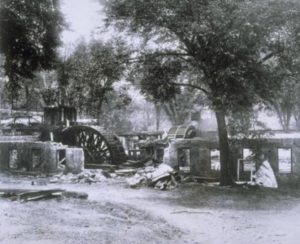
Birth of the Brass Valley
The brass industry in Waterbury began in the mid-18th century and provided an alternative for people struggling to make a living off the rocky, exhausted soil.
Read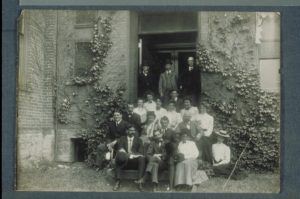
Connecticut Pin Makers
For the latter half of the 19th century and for much of the 20th century, Connecticut led the nation in pin production.
Read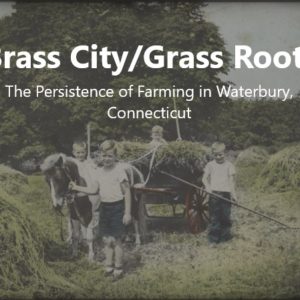
Brass City/Grass Roots: The Persistence of Farming in Waterbury, Connecticut
This article is part of the digital exhibit “Brass City/Grass Roots: The Persistence of Farming in Waterbury, Connecticut”
Read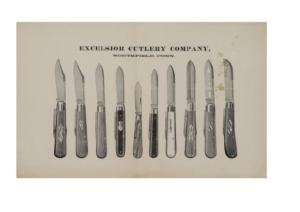
Connecticut Pocketknife Firms
Connecticut pocketknife production began around 1840. Over the next two decades, Connecticut became the earliest state to have a burgeoning craft.
Read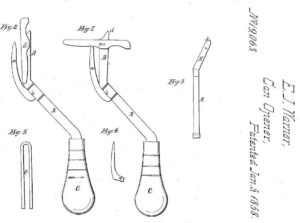
The First US Can Opener – Today in History: January 5
On January 5, 1858, Waterbury native Ezra J. Warner invented the first US can opener.
Read
Waterbury Clock Company Saved by Mickey Mouse – Who Knew?
The Ingersoll Waterbury Company (now Timex) was saved from bankruptcy during the Great Depression, in part, by the introduction of the Mickey Mouse watch.
Read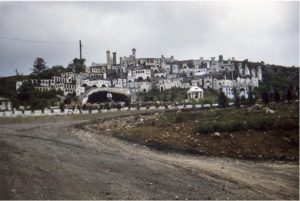
Waterbury’s Holy Land
Begun by Catholic activist John Greco in 1956, Holy Land USA fell victim to neglect and abandonment in the 1980s.
Read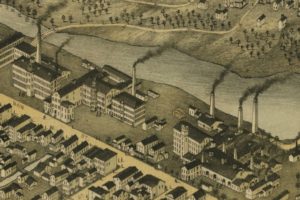
The American Brass Company: Leading the Way in the “Brass Valley”
The American Brass Company helped make the Naugatuck Valley a center of international brass production until the late 20th century.
Read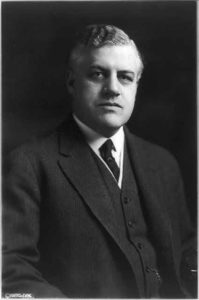
The “Red Scare” in Connecticut
The Palmer Raids, launched in Connecticut in 1919, were part of the “Red Scare” paranoia that resulted in numerous civil rights violations committed by law enforcement officials.
Read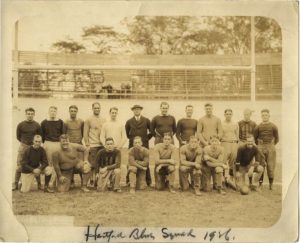
When the NFL Played in Connecticut: The Hartford Blues
In 1926, the Hartford Blues became the first and only NFL team to call Connecticut home. After a disappointing season, the NFL voted them out of the league.
Read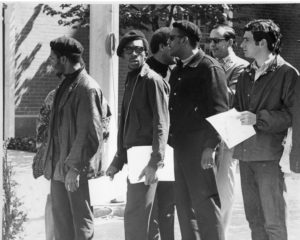
The Rise of the Black Panther Party in Connecticut
The Black Panther Party in Connecticut fought for an end to discriminatory legal and regulatory practices, often clashing with authorities to achieve their goals.
Read
Brass City/Grass Roots: Farming as Recycling: The Becces in the North End
This article is part of the digital exhibit “Brass City/Grass Roots: The Persistence of Farming in Waterbury, Connecticut”
Read
Brass City/Grass Roots: Waterbury Farming in the Late 1800s
This article is part of the digital exhibit “Brass City/Grass Roots: The Persistence of Farming in Waterbury, Connecticut”
Read
Brass City/Grass Roots: From Farmers to Developers: The Rasmussens of Town Plot
This article is part of the digital exhibit “Brass City/Grass Roots: The Persistence of Farming in Waterbury, Connecticut”
Read
Brass City/Grass Roots: The Pierponts of East Farms
This article is part of the digital exhibit “Brass City/Grass Roots: The Persistence of Farming in Waterbury, Connecticut”
Read
Brass City/Grass Roots: Struggles and Decline
This article is part of the digital exhibit “Brass City/Grass Roots: The Persistence of Farming in Waterbury, Connecticut”
Read
Brass City/Grass Roots: Food Marketing and Processing as Part of Civic Culture
This article is part of the digital exhibit “Brass City/Grass Roots: The Persistence of Farming in Waterbury, Connecticut”
Read
Brass City/Grass Roots: What Makes a Farm a Farm? Other Sites of Food Production in Waterbury
This article is part of the digital exhibit “Brass City/Grass Roots: The Persistence of Farming in Waterbury, Connecticut”
Read
Brass City/Grass Roots: Remnants and Revivals
This article is part of the digital exhibit “Brass City/Grass Roots: The Persistence of Farming in Waterbury, Connecticut”
Read
Brass City/Grass Roots: Bucks Hill: Waterbury’s Rural Holdout
This article is part of the digital exhibit “Brass City/Grass Roots: The Persistence of Farming in Waterbury, Connecticut”
Read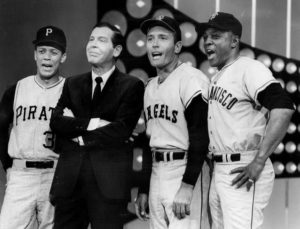
Jimmy Piersall’s Public Struggle with Mental Illness
Professional baseball great Jimmy Piersall battled with mental illness all of his life.
Read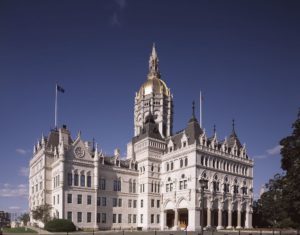
The State Cantata – Today in History: June 3
On June 3, 2003, the Connecticut General Assembly designated The Nutmeg, Homeland of Liberty by Dr. Stanley L. Ralph as the State Cantata.
Read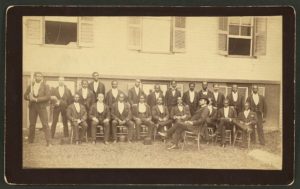
Swinging for the Fences: Connecticut’s Black Baseball Greats
In Connecticut, African Americans played organized baseball as early as 1868, some of the game’s biggest stars played for teams throughout the state.
Read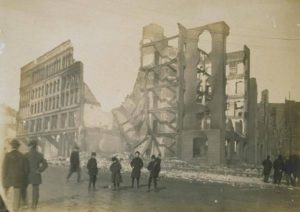
Waterbury Burns – Today in History: February 2
In 1902, nearly all of Waterbury’s downtown district was destroyed by one of the worst fires in the city’s recorded history.
Read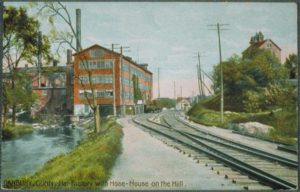
Rivers of Outrage
Pollution of Connecticut’s waters by industrial waste and sewage in the decades after the Civil War was arguably the state’s first modern environmental crisis.
Read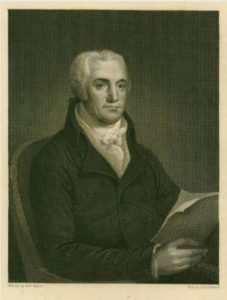
The Hartford Wits
Eventually taking the name the “Hartford Wits,” influential figures of the 18th century got together to write poetry that documented the state of the times.
Read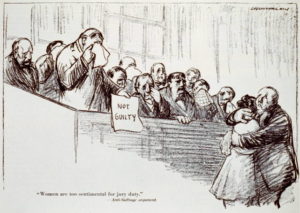
Elizabeth W. Coe Demands the Right of Jury Service
After passage of the 19th Amendment, Elizabeth W. Coe of Waterbury argued that women should be granted the right to serve on jury panels.
Read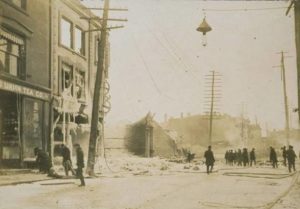
Six Cities Respond to 1902 Waterbury Fire – Who Knew?
A fire, which swept through Waterbury on a stormy February evening in 1902, would become the worst in its recorded history up to that point.
Read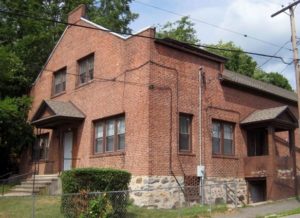
A Woman Who Developed Tolerance: Leila T. Alexander
As a member of the War Council, Leila T. Alexander served on several Council committees including education, employment, advisory, social service, and welfare.
Read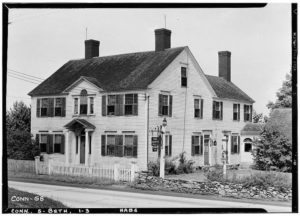
The House That Hoadley Built
The Wheeler-Beecher House (Hoadley House) serves as an outstanding example of Colonial architecture and also of renowned architect David Hoadley’s work.
Read
Waterbury Tornado – Today in History: May 24
On May 24, 1962, a tornado hit the towns of Waterbury, Wolcott, and Southington.
Read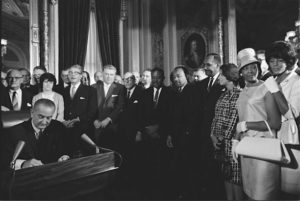
Selma, Not So Far Away
Father Leonard Tartaglia was sometimes called Hartford’s “Hoodlum Priest.” Like the 1961 film of the same name, Tartaglia ministered to the city’s poor and disenfranchised.
Read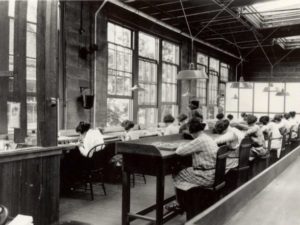
Waterbury’s Radium Girls
In the early 20th century, girls working at the Waterbury Clock Company faced death and disease from exposure to radium in the workplace.
Read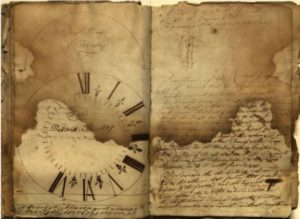
When the World Ran on Connecticut Time
The success of the clock- and watch-making industries in Connecticut came about in an era when the state was just beginning to realize its industrial potential.
ReadMore Articles




